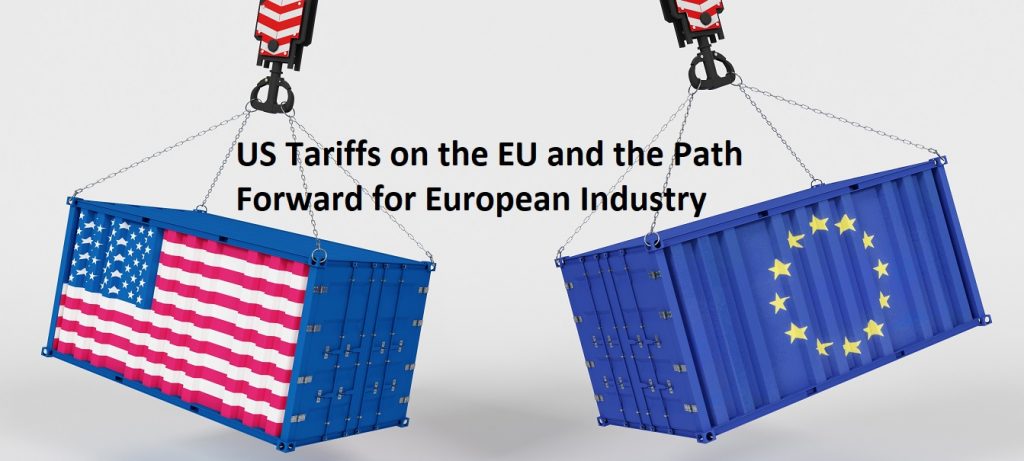Analyzing the Economic Impact of US Tariffs on the EU and the Path Forward for European Industry
The ongoing tariff war between the United States and the European Union (EU) has created significant challenges for European businesses, especially small and medium-sized enterprises (SMEs). With the imposition of tariffs by the US and retaliatory measures by the EU, the impact on trade flows and economic stability is undeniable. As the global trade environment continues to evolve, it’s crucial to understand the implications of these tariffs on the EU’s economy and explore the strategies that can help the Union weather the storm and emerge stronger.
The Roots of the Trade Conflict
The trade tensions between the US and the EU have been escalating since the Trump administration’s “America First” policy. The US targeted key EU products like steel, aluminum, and agricultural goods, citing national security concerns. In 2018, the US imposed tariffs on European steel and aluminum, and the EU retaliated with tariffs on a variety of American products, including whiskey, motorcycles, and jeans.
The trade war intensified when the US imposed additional tariffs on EU goods, notably luxury products like French wine and German cars, in response to the ongoing dispute over subsidies provided to aerospace giants Boeing and Airbus. As tensions continued to rise, both sides filed complaints at the World Trade Organization (WTO), leading to further uncertainties in the global trade environment.
Economic Implications for the European Union
The ongoing tariff war has had a significant impact on the European Union’s economy. Here’s a breakdown of the major economic consequences:
- Higher Export Costs: Tariffs imposed by the US have raised the cost of European exports, making them less competitive in the American market. Steel, aluminum, and automotive sectors have been particularly hard-hit. European manufacturers are facing higher production costs, which, in turn, affect their profit margins and job stability. Example: The European steel industry faced a 25% drop in exports to the US in 2023 due to higher tariffs, resulting in a substantial loss of market share and revenue for companies in countries like Germany and Italy.
- Impact on SMEs: Small and medium-sized enterprises (SMEs), which make up a significant portion of the EU’s economy, have been particularly vulnerable to the effects of the tariff war. Many of these businesses rely on exports to the US market, and the increased costs due to tariffs can put them at a disadvantage compared to larger companies that can absorb these costs more easily. Example: A family-owned Italian leather goods manufacturer saw a 40% reduction in its US orders after the tariffs were imposed, leading to layoffs and a reduction in production capacity.
- Foreign Direct Investment (FDI) Concerns: The uncertainty created by the trade dispute has made the EU a less attractive destination for foreign direct investment (FDI). Investors, especially those in industries like electronics and automobiles, have been hesitant to commit to long-term projects in Europe due to concerns about tariff increases and unpredictable trade policies. Example: In 2023, FDI inflows into the EU dropped by 8%, primarily due to trade tensions with the US, as potential investors delayed or scaled back their expansion plans.
The European Union’s Response to the Tariff War
To mitigate the adverse effects of the US tariff war, the European Union must adopt a comprehensive approach, focusing on domestic economic growth, market diversification, and strengthening its global trade relationships.
- Strengthening Domestic Manufacturing: The EU must boost its manufacturing sector to reduce dependence on exports and become more self-sufficient. Initiatives like the “European Green Deal” and the “Digital Europe Programme” focus on fostering innovation, improving sustainability, and enhancing industrial capabilities within the EU. Example: The EU’s commitment to renewable energy has led to increased investments in solar panel production, reducing the need for imports and making Europe more resilient in the face of trade tensions.
- Diversifying Export Markets: The EU should actively seek to diversify its export markets beyond the US. Strengthening trade ties with other regions such as Asia, Africa, and Latin America can help mitigate the impact of tariffs on the US market. By engaging in new free trade agreements (FTAs) and enhancing its participation in existing regional trade agreements, the EU can secure new market access and reduce reliance on any single region. Example: The EU’s trade agreements with Japan and Canada have allowed European manufacturers to increase exports in sectors such as automobiles, chemicals, and machinery.
- Enhancing Competitiveness Through Innovation: The EU must continue investing in research and development (R&D) and innovation to maintain its competitiveness on the global stage. By upgrading technologies, improving production processes, and investing in cutting-edge industries such as AI, biotechnology, and green energy, the EU can strengthen its economic position. Example: Germany’s automotive sector, a key part of the EU’s economy, is undergoing a transformation toward electric vehicles, with several major automakers committing to investing in new EV technologies to compete in global markets.
- Strengthening Domestic Consumption: With a large and growing consumer base, the EU has an opportunity to reduce its reliance on exports by promoting domestic consumption. Through policies that encourage consumer spending and support local businesses, the EU can create a more resilient and self-sustaining economy. Example: European retailers, such as IKEA and H&M, have successfully expanded their market share by focusing on affordable, locally produced goods to meet the rising demand from European consumers.
The tariff war between the US and the EU presents significant challenges for the European economy. However, through a combination of strengthening domestic manufacturing, diversifying export markets, investing in innovation, and boosting domestic consumption, the EU can mitigate the effects of the trade dispute and continue to grow its economy. By taking proactive measures and fostering stronger international relationships, the EU can position itself for long-term success in a complex global trade landscape.
EuropeanUnion #USTariffWar #TradeRelations #Economy #SMEs #Innovation #GreenDeal #FDI #TradePolicies

